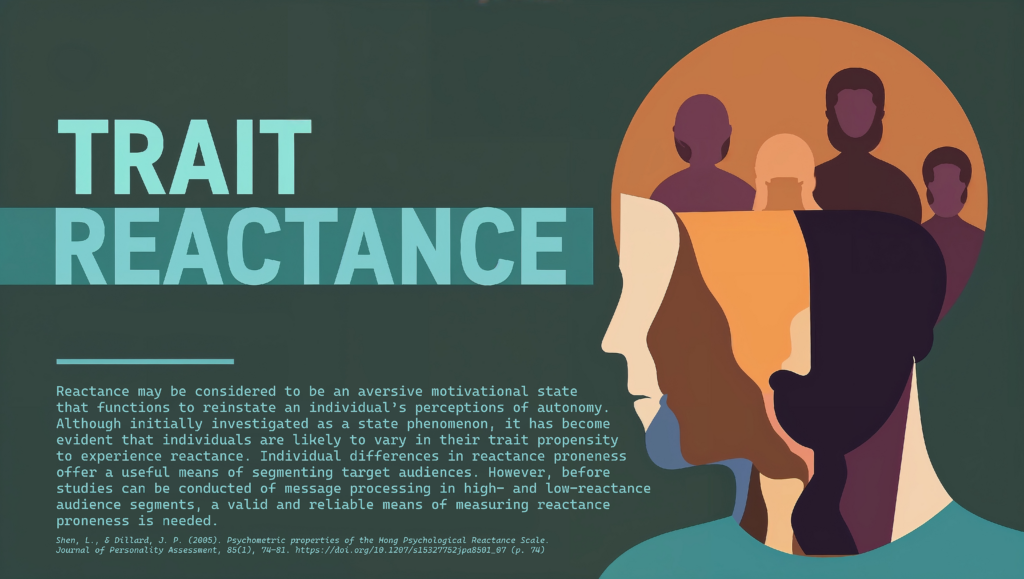Ever wondered how you respond when someone tries to restrict your freedoms? Dive into our interactive tool, crafted around the refined Trait Reactance Scale by Hong and Faedda (1996), and uncover your personal reactance profile. To ensure the most accurate results, please complete this tool before continuing to read further on this page, as prior knowledge (i.e., priming*) could influence your responses.
Our tool includes 13 statements for you to consider. Reflect on how much each statement resonates with you personally. Remember, there are no right or wrong answers—simply trust your instincts. You’ll rate each statement on a scale from 1 to 5, where 1 signifies „strongly disagree“ and 5 „strongly agree,“ with the numbers in between allowing for gradation in your responses.
Once you’ve responded to all the questions, you’ll receive a customized analysis of your results. Curious to learn more about trait reactance? Simply scroll down to the bottom of this page for further insights.
*What is priming?
Priming is a psychological phenomenon where exposure to a stimulus influences how you respond to a subsequent stimulus. For instance, if you see words related to freedom before taking a survey, you might be more likely to think about autonomy and react in a certain way. Priming can influence our thoughts, feelings and behaviors in subtle ways, often without us being aware of it. It’s important to take the trait reactance test before reading more about the topic, as any prior information might affect your responses.
Read more:
Bargh, J. A., & Chartrand, T. L. (2000). The Mind in the Middle: A Practical Guide to Priming and Automaticity. In H. T. Reis & C. M. Judd (Eds.), Handbook of Research Methods in Social and Personality Psychology.
Higgins, E. T. (1996). Knowledge Activation: Accessibility, Applicability, and Salience. In E. T. Higgins & A. W. Kruglanski (Eds.), Social Psychology: Handbook of Basic Principles.
Trait Reactance Questionnaire:
Find all questions, factors and reliability in Hong, S.-M., & Faedda, S. (1996). Refinement of the Hong Psychological Reactance Scale. Educational and Psychological Measurement, 56(1), 173–182.
But now, let’s start!
Important: Even if you choose the middle number, you must click on the answer bar.
After you finish the questionnaire; or if you don’t want to do it, you can scroll down for more information about trait reactance and the difference to state reactance.

So what was your score?
In most samples, the mean trait reactance score falls between 3.0 and 4.5 on a 7-point scale, showing that most people have a moderate tendency towards reactance. It’s worth mentioning that scores can vary quite a bit depending on the person and the situation. There is no normative “good” or “bad” in high or low trait reactance.
The term ‚trait reactance‘ is used to describe how people tend to react when they feel they’re being controlled or their freedom is being restricted. A high score means, that you are sensitive to these restrictions and more protective in your resulting behavior. This concept has its roots in clinical psychology, where it has been used to help us understand why patients might resist therapy. People with high trait reactance are more likely to react strongly to threats to their autonomy in a range of situations. People with a high trait reactance have been shown to be more impulsive when they react to situational freedom restrictions. Did you notice that the test also asked about how you approach authority, control and decision-making? All these factors play into the trait reactance nature.
State Reactance vs. Trait Reactance
The difference between trait and state reactance is important: Trait reactance is a stable personality trait that predicts how likely an individual is to react defensively in general. In contrast, state reactance refers to the temporary response an individual has in a particular situation when they perceive a threat to their freedom. In essence, trait reactance relates to an individual’s general tendencies, whereas state reactance relates to their reactions in specific moments. See our literature page for a literature review on state reactance.
For further reading on Trait Reactance:
Hong, S.-M. (1992). The Hong Psychological Reactance Scale (HPRS)
Hong, S.-M., & Faedda, S. (1996). Refinement of the Hong Psychological Reactance Scale. Educational and Psychological Measurement, 56(1), 173–182.
